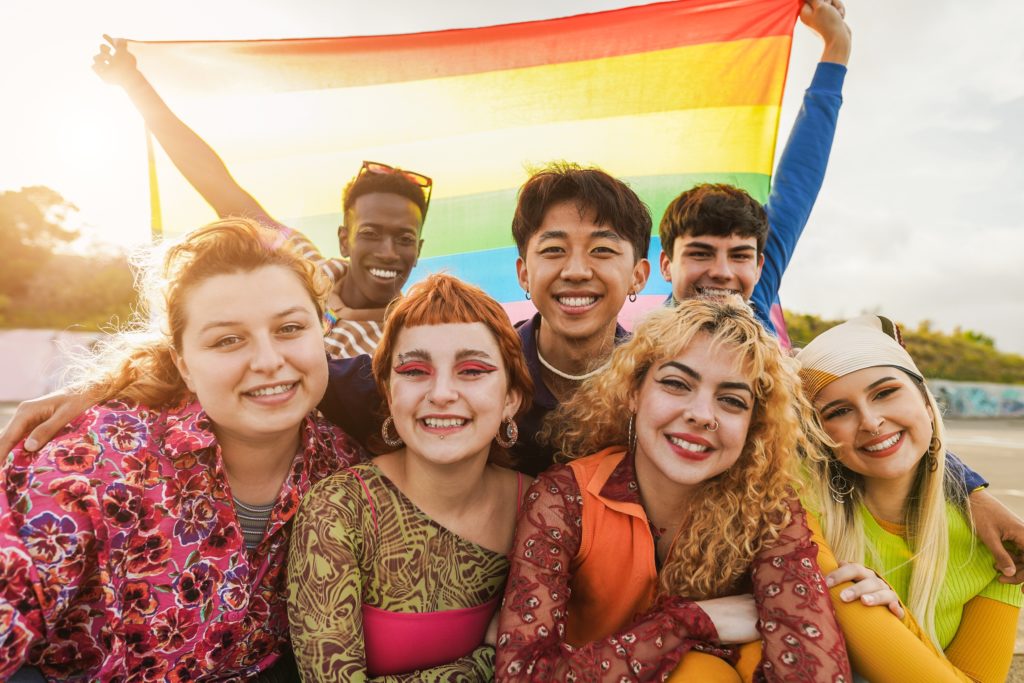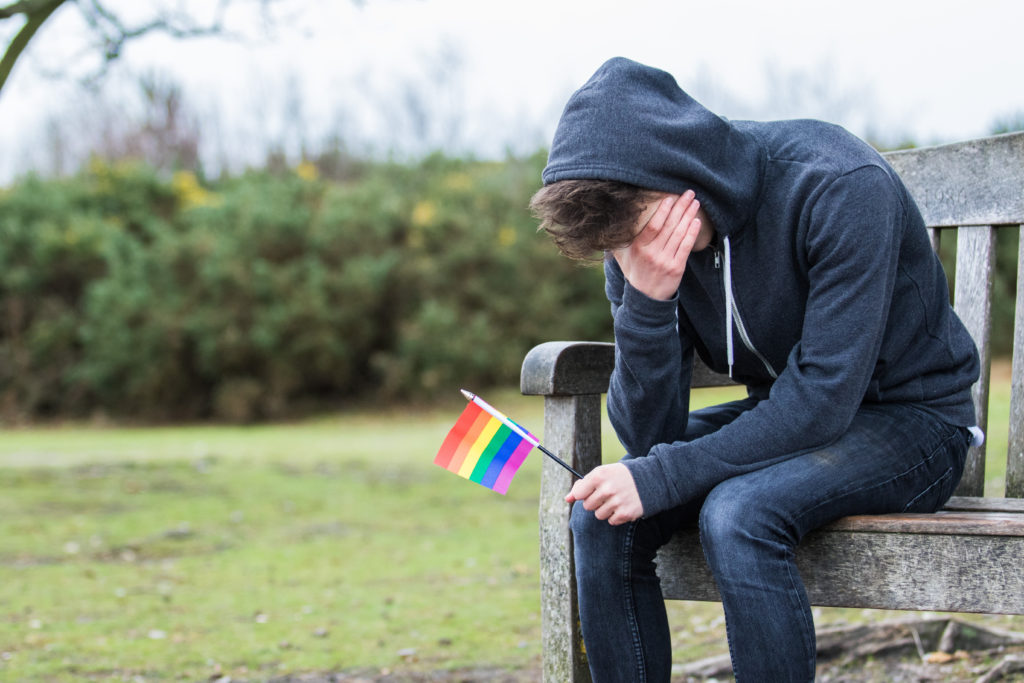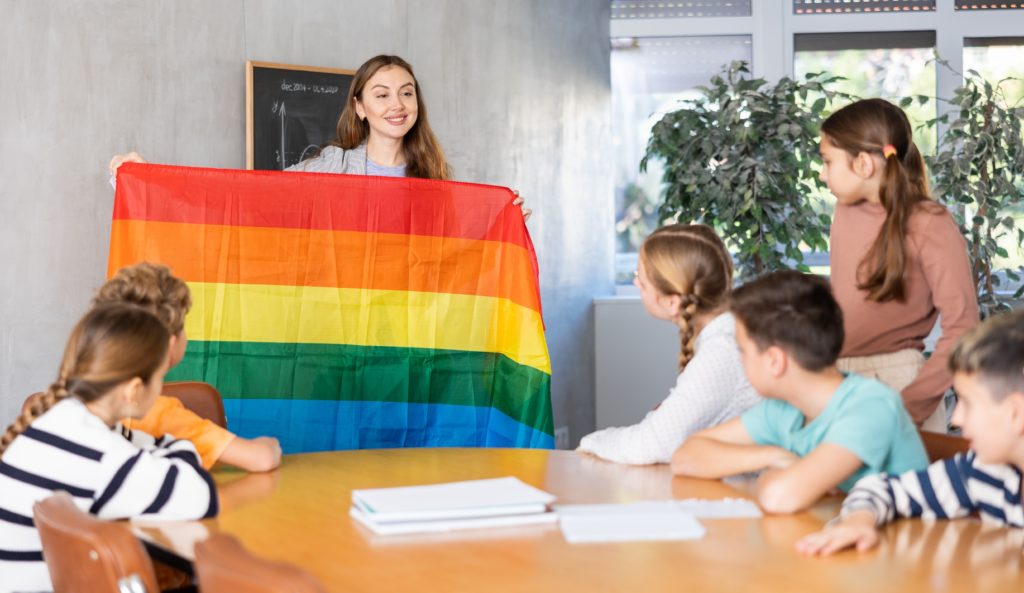Beyond being subjected to discrimination, bullying, and even violence based on their sexual orientation or gender identity, young people in the LGBTQ community can also be exposed to efforts to change their sexual orientation through therapy or religion. This directly violates the United Nations Convention on the Rights of the Child (UNCRC) and can have several negative physical as well as mental consequences. LGBTQ+ youth require support from their families, schools, and humanitarian organizations to ensure their mental and physical safety as well as combat any discrimination they may experience.

Who are LGBTQ+ youth?
The gender identity of children may or may not be compatible with their ascribed sex at birth. In addition, sexual, affective, and/or romantic orientation may be distinct from a person’s gender identity.
Cisgender is a term used to characterize individuals whose gender matches the sex ascribed to them at birth. LGBTQ+ youth can be described by terms such as lesbian, homosexual, bisexual, and queer in terms of their emotional and sexual orientation. Children who identify as LGBTQ+ have internal feelings of gender identities that vary based on their ascribed gender at birth (Stone Wall, n.d.).
LGBTQ+ youth and youth raised by lesbian, homosexual, bisexual, or transgender (LGBTQ+) parents often encounter discrimination, bullying, and even violence due to their sexual orientation or gender identification. Non-discrimination is one of the UNCRC’s four fundamental principles, which guides its interpretation and application.
Article 2 states that all children are entitled to the rights outlined in the UNCRC and that individual children and adolescents should not be discriminated against when these rights are implemented. This includes direct and indirect discrimination as well as children’s rights not to be discriminated against based on their personal, emotional, and sexual orientations.
Impacts of discrimination against LGBTQ+ youth
One of the rights of children is to feel secure, content, and complete. Children can achieve this by feeling free to be themselves, valued for who they are, and a part of their school, institution, and community. However, this is not the reality for some LGBTQ+ youth.
Bullying is prevalent among LGBTQ+ children and adolescents who are perceived as distinct in some way, such as those who do not conform to gender stereotypes. Nearly half of LGBTQ+ adolescents experience harassment at school or college due to their sexual orientation (Stone Wall, n.d.).
The University of Cambridge conducted research for Stonewall’s 2017 school report and found that 53% of LGBTQ+ adolescents do not believe there is an adult at school or college with whom they can discuss their experience, and this number increases to 60% for those who believe the same at home.
Bullying and discrimination can have detrimental effects on the mental health, well-being, and academic performance of LGBTQ+ children and adolescents. Bullying in school can also lead to children to abandoning school which can have a negative impact on their future educational plans. Furthermore, LGBTQ+ children and adolescents experience disproportionately high rates of mental illness, which may eventually contribute to self-harm or suicide attempts (Stone Wall, n.d.).
Efforts to change the sexual orientation of LGBTQ+ youth

Some LGBTQ+ youth may be subjected to sexual orientation counselling and psychotherapy designed to eradicate or suppress homosexuality. These therapies are founded on the notion that homosexuality is a mental disorder. Such initiatives are harmful because they promote the notion that the sexual orientation of LGBTQ+ youth is a mental disorder or illness. According to some medical and mental health professional organizations, this approach may negatively impact the mental health of children. However, based on what the American Academy of Pediatrics states, adolescents who feel confused about their sexual identity can benefit from this counselling in identifying their own internal feelings of sexual identity (American Psychology Association, n.d.).
Some individuals and preachers in religious organizations tend to have negative attitudes toward homosexuality on the basis of their religious beliefs. Repentance and faith form the foundation of their strategy for altering the sexual orientation of LGBTQ+ individuals and LGBTQ+ youth in particular.
Such individuals and organisations consider homosexuality to be immoral or evil, and LGBTQ+ youth has no self-discipline or willpower to alter what these individuals and organisations perceive to be wrong. Promoting that in schools with such ministries would likely exacerbate the discrimination, intimidation, and fear of LGBTQ+ youth (American Psychology Association, n.d.).
How can parents best support LGBTQ+ youth?
As a result of their sexual orientation and gender identity, LGBTQ+ youth may be exposed to various forms of assault from their peers or society. Therefore, children must receive support from parents, teachers, and humanitarian workers to remain healthy and secure. Paul Mitrani, MD, a child and adolescent psychiatrist at the Child Mind Institute, stated, “People are more capable when they feel cherished and supported. They have greater tenacity.” (Child Mind, 2022).
Children who receive support, particularly from their families, can attain greater self-esteem, social support, and overall health. Support can also have an effect on the mental health of a child, reducing the level of depression as well. Families and instructors who embrace LGBTQ+ youth can protect them from drugs, unprotected sex, and suicidal behaviours (Fadem, 2022).
Parents may experience a range of emotions that prevent them from assisting their children upon learning their children’s internal sexual orientation and gender. As a parent, one may be concerned about how society will regard one’s child at school or that the trends of one’s child’s peer group have influenced their child’s sexual orientation.
None of these should prevent families from safeguarding their children and ensuring their safety. Parents should engage in open communication with their children, in which they listen without judgment, inquire about their experience and help them feel supported by conveying their love for them and showing them affection.
As there is much misinformation about sexual orientation and gender identity, parents should also make an effort to educate themselves by using a team approach that includes a paediatrician, a school counsellor, close family members, and even community organizations (Fields, n.d.). In addition, parental advocacy for their children can be an excellent buffer against some of the adversity they may encounter outside the home (Fields, n.d.).
The role of educators and humanitarian organizations in supporting LGBTQ+ youth

As children spend nearly as much time in the classroom as they do at home, the significance of schools’ roles in supporting LGBTQ+ youth may rival that of parents. In light of this, schools can play an effective role in assisting LGBTQ+ youth by maintaining regular contact with their parents.
Schools can also create a secure environment by monitoring for indicators of bullying which if addressed, can positively impact the academic performance of LGBTQ+ youth. In addition, schools must advocate for more inclusive sex education by providing LGBTQ+ students with the information they need to be secure and healthy (NSPCC, n.d.), thereby filling any gaps in knowledge that children may have regarding their sexual orientation.
Despite the fact that humanitarian organizations cannot reach every member of the LGBTQ+ youth in their community, they play a significant role in promoting the rights and wellbeing of LGBTQ+ youth. They strive to better the lives of LGBTQ+ youth and their families by promoting gender equality awareness.
In addition to promoting and spreading awareness of LGBTQ+ children’s rights, humanitarian organizations should also promote laws, policies, and practices that promote healthy and safe development, including legal recognition for every child regardless of gender identity or sexual orientation. All parents, educators, and institutions of higher learning should take advantage of these initiatives to comprehend, support, and encourage LGBTQ+ youth.
Written by Malak Rababa
Internally proofread by Aditi Partha
Updated on May 28, 2023
References:
American Psychological Association (n.d.) Just the facts about sexual orientation and youth Retrieved from the American Psychology Association at https://www.apa.org/pi/lgbt/resources/just-the-f, accessed on May 23, 2023.
Child Mind Institute (2022, June 14). How to Support LGBTQ Children Retrieved from Child Mind at https://childmind.org/article/how-to-support-lgbtq-childre, accessed on May 23, 2023.
Fadem, R. (2022, June 29). How to support your LGBTQ child’s mental health. Retrieved from CNN at https://edition.cnn.com/2022/06/29/health, accessed on May 23, 2023.
Fields, E., & Sanders, R. (Eds.). (n.d.). Tips for Parents of LGBTQ Youth. Retrieved from Hopkins Medicine at https://www.hopkinsmedicine.org/health/wellness-and-, accessed on May 23, 2023.
Human Rights Campaign (n.d.) Caring for LGBTQ children and youth. Retrieved from the Human Rights Campaign at https://assets2.hrc.org/files, accessed on May 23, 2013.
NSPCC. (n.d.). Safeguarding LGBTQ+ children and young people. Retrieved from NSPCC at https://learning.nspcc.org.uk/safeguarding-child-protection/, accessed on May 23, 2023.
Optionb. (n.d.). Why Accepting Your LGBTQ Child Matters—And How to Start. Retrieved from Optionb at https://optionb.org/articles/why-accepting-your-lgbtq-, accessed on May 23, 2023.
Samhsa. (n.d.). Helping families support their LGBT children. Retrieved from Samhsa at https://store.samhsa.gov/sites/default/files/d7, accessed on May 23, 2023.
Stone wall (n.d.) The experiences of LGBTQ+ children and young people. Retrieved from Stone Wall at https://www.stonewall.org.uk/experiences-lgbtq-chil, accessed on May 23, 2023.
Stone wall. (n.d.-b). What do you need to know about LGBTQ+ children and young people?. Retrieved from Stone Wall at https://www.stonewall.org.uk/what-do-you-need-know-about-lgbtq, accessed on May 23, 2023.

